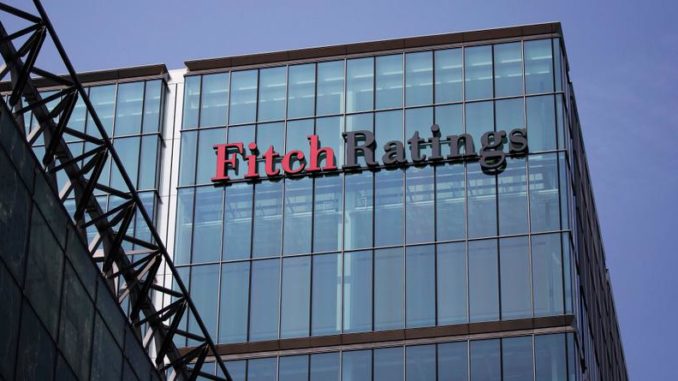Fitch Ratings has upgraded the Long-Term Foreign- and Local-Currency Issuer Default Ratings of Kaduna, Kogi, Lagos, and Oyo states from ‘B-’ to ‘B’, reflecting improved macroeconomic stability and recent policy reforms in Nigeria.
The global ratings agency announced the development on its website on Saturday, noting that the outlook for all four states remains Stable.
According to Fitch, the rating action follows the upgrade of Nigeria’s sovereign credit rating from ‘B-’ to ‘B’ on April 11, 2025.
The agency explained that in line with its rating criteria, the sovereign rating upgrade has been mirrored in the states, given the predominant role of the federal government in Nigeria’s intergovernmental fiscal framework.
“We consider the Federal Government’s role is predominant in intergovernmental relations, as it controls the equalisation mechanism enacted through a system of transfers to states. Therefore, the upgrade of sovereign IDRs is mirrored in the upgrade of those of Kaduna, Kogi, Lagos, and Oyo, as their Standalone Credit Profiles align with or are above the ratings of Nigeria,” Fitch stated.
The agency cited several key drivers behind the revised projections for the four states. These include a steeper depreciation of the naira, expected to exceed N1,500 to the dollar between 2024 and 2028, and a trend of high but gradually declining inflation.
It also noted an increase of over 20 per cent in federal VAT and oil-related transfers to the states in 2024, providing critical financial support.
However, Fitch warned that the sharp weakening of the naira heightens debt service risks for states with substantial external debt exposure.
Fitch reported that 86 per cent of Kaduna State’s direct debt at the end of 2023 was denominated in foreign currencies, exposing the state to significant currency risk.
While Kaduna benefits from strong operating margins of about 40 per cent, driven by internally generated revenue growth and increased federal transfers, the agency projects the state’s payback ratio to remain high at around 18 times, reflecting weak debt service capacity.
For Kogi State, Fitch said its debt mix between domestic and foreign borrowings is largely tied to ambitious capital expenditure projects.
The state’s payback ratio is projected to remain around 20 times over the medium term, with the agency highlighting Kogi’s vulnerability to oil revenue fluctuations that could impact fiscal balances.
In Lagos State, despite having 50 per cent of its direct debt in foreign currencies, Fitch projects a far stronger fiscal position. Lagos’s payback ratio is expected to remain robust at around five times by 2028, underpinned by its exceptional internally generated revenue, which accounts for 75 per cent of its total operating revenue compared to the national average of 25 per cent. The state is also expected to record a budget surplus in 2024.
Oyo State, with a predominantly local currency debt profile, faces lower foreign exchange risk. Fitch expects its payback ratio to stay below nine times, buoyed by a rise in federal transfers. Nonetheless, concerns persist over Oyo’s reliance on oil revenues and its weaker secondary fiscal metrics.
Fitch also assessed environmental, social, and governance risks across the states. Kaduna, Kogi, and Oyo each received an ESG Relevance Score of 4 for Biodiversity and Natural Resource Management, reflecting their dependence on oil revenues. Kaduna faces additional ESG-related challenges, including low energy management efficiency, ongoing ethnic conflicts impacting civil rights, below-average human development indicators, and a significant population living in poverty.
The agency further noted that Lagos State’s Standalone Credit Profile is assessed at ‘b+’, reflecting a vulnerable risk profile and strong financial metrics at the upper end of the ‘aa’ category.
However, its overall rating remains capped by Nigeria’s sovereign ceiling. Meanwhile, Kaduna, Kogi, and Oyo states maintain ‘b’ SCPs, characterised by vulnerable risk profiles and financial metrics between the ‘a’ and ‘bb’ range.
Fitch concluded that although external risks persist, the overall financial profiles of the four states have strengthened in line with the broader improvement in Nigeria’s macroeconomic fundamentals.
The Governor of Lagos State, Babajide Sanwo-Olu has hailed the recent upgrade of Lagos State’s credit rating by Fitch Ratings, describing it as a testament to the strength of his administration’s policies and execution.
In his response, he emphasised that the upgrade is not only a recognition of past achievements but also a call to remain committed to even greater action moving forward.
“This is a good verdict on our performance in terms of policy decisions and project execution. It is also a call for us to be more active; we will be in every sector. I thank Lagosians for their support,” Sanwo-Olu said.
Sanwo-Olu further explained that the state’s ability to weather economic challenges, despite external factors like currency fluctuations, is rooted in its strong financial standing.
He noted that by the end of 2023, 50 per cent of Lagos State’s direct debt was denominated in foreign currencies, exposing it to currency risks. However, Fitch projects that the state will maintain a strong payback ratio of five times by 2028, reinforcing the state’s ability to service its debt obligations.
“The agency noted that by the end of Y2023, 50 per cent of Lagos State’s direct debt was denominated in foreign currencies, highlighting a notable exposure to currency fluctuations. However, despite this, Fitch projects Lagos’s payback ratio to remain strong at around five times by the end of Y2028,” he added.
He reiterated his administration’s commitment to sustainable economic development, stating that the state will continue to prioritize projects that drive long-term growth and investment.
Do you want to share a story with us? Do you want to advertise with us? Do you need publicity for a product, service, or event? Contact us on WhatsApp +2348183319097 Email: platformtimes@gmail.com
We are committed to impactful investigative journalism for human interest and social justice. Your donation will help us tell more stories. Kindly donate any amount HERE




